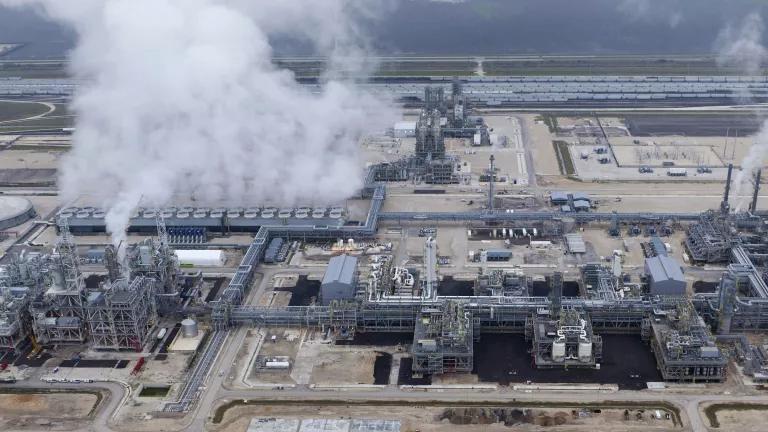An independent panel of scientific experts today reaffirmed that an oil industry association’s study of California’s landmark clean energy law (AB32), in particular the Low Carbon Fuel Standard, was flawed on a number of fronts, saying it did not “include a full accounting of the economic impacts, or the health and welfare impacts of the legislation on the broader population and economy of the state,” such as “positive effects on the health and welfare of the citizens of California that could result from the implementation of AB32.”
Similar to several earlier reviews (here, here, and here) that essentially gave a failing grade to the Western States Petroleum Association (WSPA) report, the scientists assembled by the University of California disputed the oil industry association’s claims regarding the ability and costs to meet AB32, the impacts on the state’s economy and the refining industry, itself. In summary, the reviewers said of WSPA’s report “we are concerned about some of its assumptions, methodologies and results.”
This latest rebuke is the most damning yet, not only in that it dismantles many of the petroleum industry’s central arguments against the Low Carbon Fuel Standard (LCFS), which requires oil companies to reduce the carbon pollution from gasoline and diesel by 10 percent by 2020, but also in that it seems to have caught the industry by surprise.
In fact, WSPA’s report, conducted by Boston Consulting Group, has been so heavily criticized that the association itself called for this independent academic review and was one of its three major funders.
Today’s independent review said the WSPA report against the AB32, including the LCFS, was flawed in that it (1) understated the benefits of AB32 on the economy; (2) overstated the cost to the industry of complying; and (3) overstated the likely impact on California’s refining industry.
On impact on California’s economy, the independent reviewers found:
- The WSPA report “narrowly focused on the economic impacts of AB32 on the state’s oil refining industry and does not, in the opinion of the reviewers, include a full accounting of the economic impacts, or the health and welfare impacts of the legislation on the broader population and economy of the state.”
- “The report also does not include other positive effects on the health and welfare of the citizens of California that could result from the implementation of AB32, including health benefits resulting from less and cleaner fuel use (resulting in better air quality), reductions in congestion resulting from less driving, and stimulation of innovative activity that might result from its regulations.”
- “Clean tech oriented firms may be attracted to move in because their products would be more highly valued here… This was not considered in the modeling in the report…”
- “These results follow from the previously discussed assumptions and findings which are based on an admittedly unlikely scenario…. We find this [job loss] projection implausibly high...”
- “The wealth transfer as discussed in the report is really a transfer from refiners to state government which could then be strategically recycled back into the economy in ways that would avoid large economic losses.” That is, the report essentially ignored any benefits to Californians from reinvestment. Program proceeds derived from setting a carbon price on the oil industry pollution is being reinvested back into the California economy, with special emphasis on investment projects in disadvantaged communities and local projects, and mitigating impacts to lower-income consumers.
On the industry’s costs and ability to comply, the independent reviewers found:
- “A number of other low-cost pathways have started to emerge that were not originally anticipated… [Including] new low-carbon liquid biofuels that do not require dedicated infrastructure or advanced technology vehicles have emerged.”
- “a group of these [compliance option] responses taken together appear able to satisfy the requirements of AB32 more easily and potentially at lower cost than the option included in the BCG scenario.
- “Adding to our conceptual concerns about the limited responses assumed by BCG [Boston Consulting Group] in a number of areas, recent data and responses… indicate that the responses of the fuels system in California have already been more substantial in several areas than BCG projected. First, the average carbon intensity of transportation biofuels in the state has dropped steadily over the past two years… new sources of “drop-in fuels” such as renewable diesel are coming on line….refiners have the opportunity to accumulate banks of LCFS credits and continued to do so through 2012….allowance prices are at the low end of the range considered by BCG…refiners have diversified upstream into low-carbon production activities.”
- The reviewers cite even one oil company stating, “While no one producer or type of low-carbon fuel will be able to replace traditional petroleum transportation fuels in the near term, Neste Oil believes its efforts, along with others like it, can contribute to the continued success of the LCFS.” The reviewers note that the Neste Oil renewable diesel project alone satisfies roughly half the LCFS requirements for the entire industry in 2013 and 2014.
- Even after expressing their concerns that “reviewers think the report’s full set of assumptions is unlikely and have concerns about certain aspects of the methodology used to calculate impacts” they flag that “The California Air Resources Board has recently announced its intention to modify the Low Carbon Fuel Standard (LCFS) in ways that could enable the generation of additional LCFS credits and possibly include explicit cost containment measures by the end of this year. The latter could substantially reduce the concerns raised in the BCG report concerning cost shocks or wild swings in allowance prices.” So even if the oil industry’s unlikely doomsday scenario occurs, the Air Resources Board is taking measures to protect against this from ever happening.
On impact on the refining industry, the independent reviewers found:
- “The reviewers feel that the primary relevance of the report is as an assessment of a very bad case outcome for the refinery sector in California and even from that perspective, several questions about the appropriateness of the assumptions and methodology remain.”
- It is “possible that California refiners will diversify upstream into biofuels production, contract for newly developed lower cost domestic crude oils or engage in other strategic activities to maintain profitability and avoid shutting down and laying off refinery workers.”
- “Refineries in California could employ at least two major strategies to stay in operation: (1) they could diversify upstream into the fuels segment of the market in California and in other locations that provide low-carbon fuels to the state, and (2) they could line up new lower-cost domestic supplies… Recent industry behavior…suggests the refinery industry in California has already started pursuing these two strategies to improve its economics.”
- “California refiners have also started contracting for lower cost U.S. based crude supplies which have a geographical cost advantage relative to current supplies… these strategies should make refinery economics in the state more favorable…”
- “With the larger economic incentives provided by the [AB32] regulations, we also believe many more energy efficiency options would become economic with the implementation of AB32. Some of these might involve investments to expand low-carbon fuel input or product output flexibility which could help speed the adjustment to the new regulations…Several other sources of revenues for refiners in the state under AB32 are also ignored in the report…which would provide more time for alternatives to enter the market, keep prices down, and potentially allow the refiners to maintain profitability for a longer period of time.”
- “The reviewers question whether some of the refineries projected to shut down under AB32 would have shut down only a few years later anyway because of federal fuels regulations and an overall trend towards reduced demand for gasoline which would either cause some of the refiners in the state to change the mix of products they produce or shut down.”
- “California refiners have also started contracting for lower cost U.S. based crude supplies which have a geographical cost advantage relative to current supplies… these strategies should make refinery economics in the state more favorable…”
Unfortunately, the oil industry continues to persist in its lobbying campaign to undermine the LCFS, which already is reducing our oil use and encouraging greater investments in cleaner, alternative fuels.
The oil industry’s effort to protect the status quo has been far-reaching. In addition to funding a number of flawed studies, Chevron and its allies have gone so far as to be the majority funders of the purported consumer group “Fueling California,” the San Jose Mercury News reported in in January. The group is focused on attacking California’s LCFS and other AB32 clean fuels policies, and an ex-Chevron vice president told Bloomberg News earlier this month “the best outcome for oil companies is if nothing changes. You can make money on advanced biofuels – you just won’t make as much money as the oil companies would like.” Chevron’s internal documents pointed to renewables like advanced biofuels costing $2.18 per gallon to produce, competitive with or even less costly than gasoline. Not surprisingly, the oil industry continues to protect their 92% market share by falsely claiming the LCFS will be far more.
But the LCFS is needed more than ever to deliver greater competition, resulting in diversification beyond crude oil, less carbon pollution, and reduced risk to gasoline price volatility. Ensuring a strong standard will help us continue to attract more investments – and jobs - to California’s clean fuels industry. Fortunately, there are already hundreds of companies investing and producing clean, alternative energy sources that can meet the standard today.
That’s a fact that not even the oil industry can ignore. It’s time for the oil industry association and companies like Chevron to stop fighting pollution standards with flawed, biased studies. Instead, they can start investing to become part of the solution.




